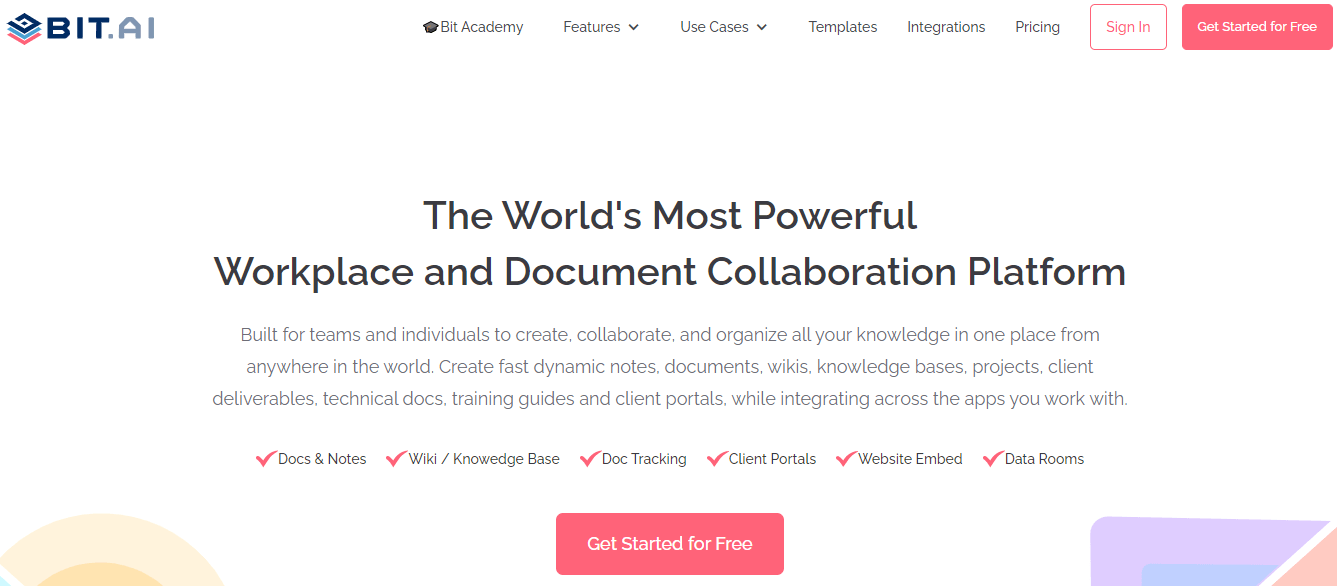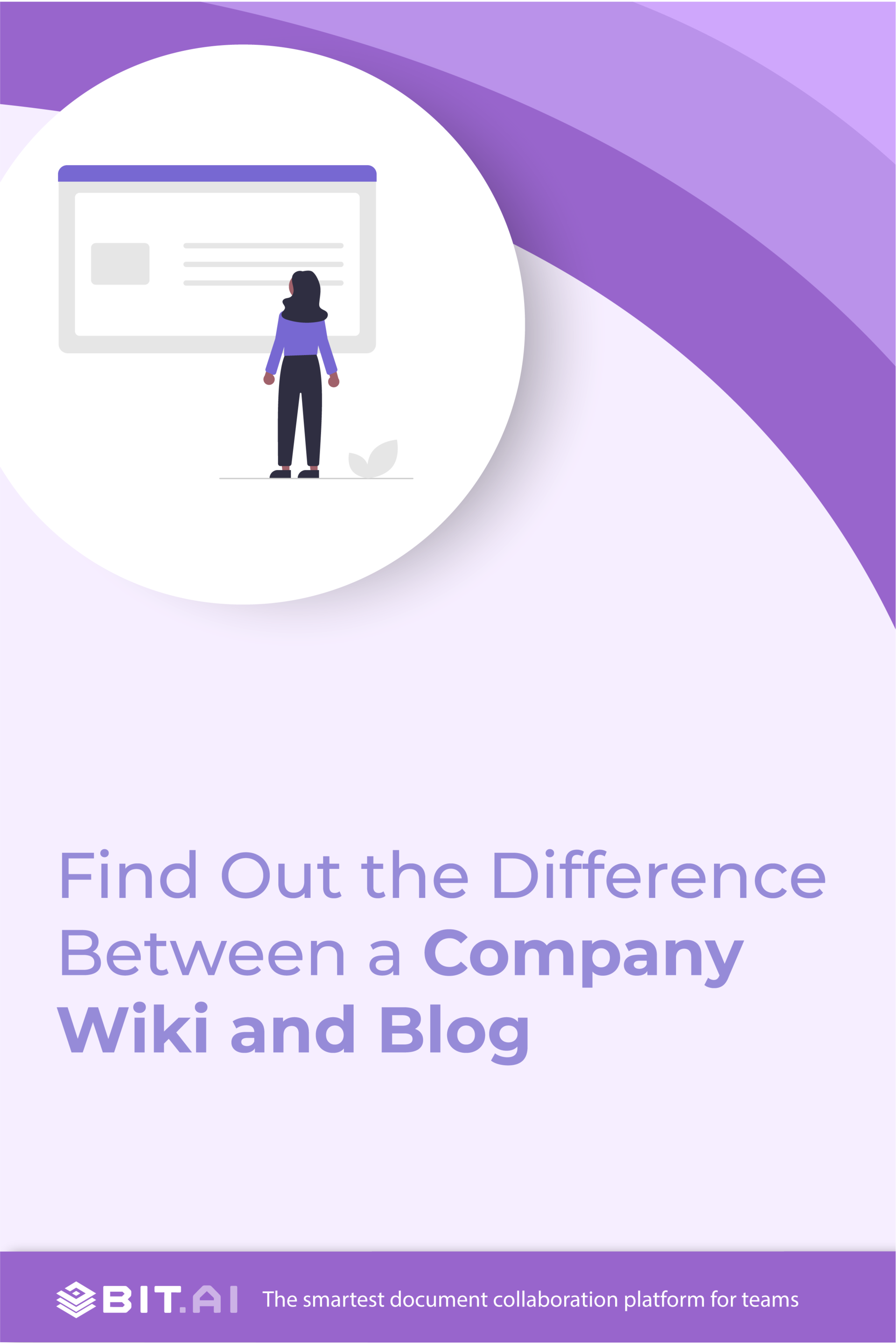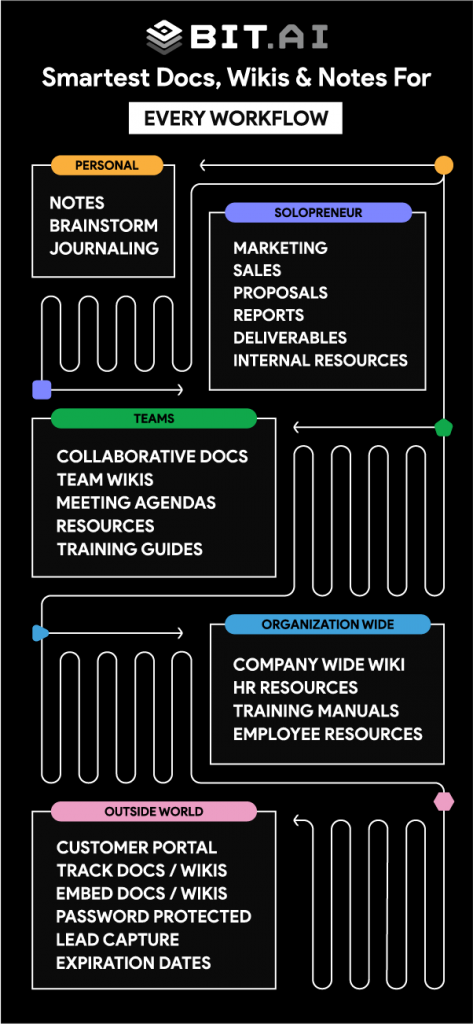Are you tired of searching through old emails and documents to find the necessary information?
If so, you’re not alone.
Managing knowledge in the workplace can be a real headache, but some tools can help. Today, we will explore two of the most powerful tools for knowledge management and collaboration: the company wiki and the blog.
These tools may sound like they belong in the tech world, but they’re useful for any organization that wants to share knowledge and collaborate more effectively.
Whether in finance, healthcare, or any other industry, a company wiki and a blog can help you capture and share institutional knowledge, foster collaboration, and drive innovation.
So, get ready to discover how these tools can revolutionize your work. Let’s dive in!
What is Company Wiki?
Let’s talk about what a Company wiki is. Simply put, it’s a knowledge-sharing platform that your team can use to collaborate, organize information, and streamline workflows. You can use it to share everything from company policies and procedures to project timelines and team member roles.
Imagine you’re a new employee starting at a company. You’re excited but also a little nervous. You don’t want to ask too many questions and come across as clueless, but you also want to do a good job. Enter the Company wiki. With all the information you need in one place, you can quickly get up to speed on everything from the company culture to how to request time off.
So how do companies use wikis? Well, there are tons of ways!
Some companies use wikis as a knowledge management tool, where employees can easily access information about company policies, procedures, and best practices.
Others use wikis as a project management tool, where teams can collaborate on projects and keep everyone up-to-date on their progress.
And some companies even use wikis as a training tool,where new employees can learn about the company’s culture, history, and values.
Now, let’s talk about the benefits of using a company wiki.
For starters, it can help improve communication and collaboration within the company. When everyone has access to the same information, it’s easier to work together and avoid misunderstandings.
Plus, it can help streamline processes and reduce employees’ time searching for information.
In fact, according to a study by McKinsey, employees spend an average of 1.8 hours per day searching for information.
Another benefit of using a company wiki is that it can help preserve institutional knowledge. When employees leave the company, they often take valuable information with them. But if that information is documented in a wiki, it can be easily accessed by new employees and future generations.
So, whether you’re a small startup or a large multinational corporation, there’s likely a wiki solution that can help you streamline your internal processes and achieve your business goals.
Now that we’ve covered the basics of a company wiki let’s dive into understanding a blog.
What is Blog?
A blog is a website or a section of a website that regularly publishes written content in the form of blog posts. These posts can cover various topics, from personal experiences and opinions to news, advice, and tutorials.
Blogs have become incredibly popular over the years and for a good reason. They offer an easy and accessible way for individuals and businesses to share their thoughts, expertise, and stories.
You will be surprised to know that over 6 million blog posts are published every day! That’s a whole lot of words being thrown around!
Many companies have now started using blogs to connect with their audience and build their brand. For example, a fashion brand might use a blog to share fashion tips and trends, while a tech company might use a blog to announce new products and share industry insights.
There are many benefits to using a blog as a business, too.
For one, it can help to drive traffic to your website and improve your search engine rankings. Blogs also provide a platform to engage with your audience and build customer relationships. By sharing valuable content and insights, you can position your brand as an authority in your industry and increase your overall credibility.
So, whether you’re a business or an individual, starting a blog can be a great way to share your thoughts, ideas, and expertise with the world.
Although a company wiki and blog may seem quite different at first glance, they share many similarities, as we’ll explore in this section.
Company Wiki Vs Blog: The Similarities
At first glance, these platforms may seem quite different: a wiki is typically used to store and share internal knowledge within a company, while a blog is often seen as a public-facing platform for sharing news and opinions.
However, upon closer examination, it becomes clear that there are many similarities between the two platforms that are worth exploring. In this section, we’ll examine some of the key ways that company wikis and blogs overlap.
Both can be used to share information
Whether writing a blog post about a new product or creating a wiki page about your company’s policies, both formats are great for disseminating information to a wide audience.
Imagine this scenario: your company just launched a new product, and you want to share the details with your employees. You could write a blog post that explains the product’s features and benefits and share it with everyone via email or social media. Or, you could create a wiki page containing all the product information, including technical specs, pricing, and marketing materials.
In fact, according to a study by the Content Marketing Institute, 55% of B2B marketers say that blog content is their top content marketing tactic, while 50% use wikis or knowledge bases to distribute content.
Both can be collaborative
While a blog is typically written by one or a few authors, it’s not uncommon for multiple people to contribute to a company blog. Similarly, a company wiki is designed to be edited and updated by multiple users, making it a collaborative platform for sharing knowledge.
With a wiki, multiple users can contribute to and edit the content, making it a living, breathing document that can evolve. Similarly, a blog allows for comments and discussion, which can lead to valuable insights and feedback from readers.
Let’s say you write a blog post about a new marketing campaign and one of your readers comments with some ideas for improving the campaign. You can take that feedback and use it to make your campaign even better. Or, if you’re working on a wiki page about company policies, your colleagues can suggest updates or corrections to ensure the information is accurate and up-to-date.
Read More: Discover the Best Wiki Software, Its Types and Benefits!
Both can be a great way to build a sense of community
Whether you’re a business owner, a team leader, or someone looking to unite people, creating a blog post or wiki page can be a fantastic way to do it.
If you run a small business and want to get your employees more engaged with each other. You could create a blog post where everyone can share their favorite recipes or discuss their hobbies. Suddenly, your team members are connecting over a shared love of baking, hiking, or whatever they’re into. You might even see increased productivity as people start working together more effectively.
Or maybe you’re part of a larger organization with teams across different locations. A wiki page could be the perfect way to encourage collaboration and teamwork. You could set up a page where everyone can share their ideas and strategies for a particular project and watch as people from different departments and locations start working together to achieve a common goal.
And if you’re not convinced yet, let’s look at some statistics. According to a study by LinkedIn, employees who feel like they’re part of a community at work are more productive, engaged, and less likely to leave their jobs.
So whether you’re creating a blog post, a wiki page, or some other format entirely, building a sense of community can impact your organization. So why not give it a try? Who knows what kind of amazing connections and collaborations might come from?
So, there you have it! Even though a company wiki and a blog might seem different at first glance, they have much in common. Both platforms allow for the easy distribution of information, collaboration, and feedback, making them valuable tools for any company.
Now that we have covered similarities let’s dive into differences.
Company Wiki Vs Blog: The Differences
While both tools can be used for knowledge management and collaboration, they have distinct differences that can affect how they are used in a business context.
- Collaboration: A company wiki allows multiple users to contribute to and collaborate on the same content, making it a great tool for projects that require input from various team members. In contrast, a blog is typically written by one person or a small group of people, with readers only able to comment on the content.
- Structure: Wikis are often organized into a hierarchy of pages, with links between related content. This makes it easy to navigate and find the information you need. Blogs are typically organized chronologically, with the newest posts at the top of the page.
- Formality: Wikis are typically written more formally, as they are often used for reference material. In contrast, blogs tend to be more informal and conversational, with the writer’s personality and style shining through.
- Tone: Wikis are typically written more formally, as they are often used for reference material. In contrast, blogs tend to be more informal and conversational, with the writer’s personality and style shining through.
- Audience: Wikis are often designed for a specific audience, such as employees or a community of users. They are intended to be accessed by people with a specific interest in the topic. In contrast, blogs are often open to a wider audience and can be accessed by anyone with an internet connection.
- Ownership: Wikis are often owned by the organization or community that created them, with multiple users contributing to the content. In contrast, a blog is typically owned by an individual or organization, with one or a few authors responsible for the content.
- Purpose: While a company wiki is often used for internal purposes, such as documenting policies and procedures, a blog is typically used for external purposes, such as sharing information and opinions with customers, clients, or the general public.
Understanding the differences between a company wiki and a blog is important, but it’s also valuable to consider why you might need both tools in your organization.
Compant Wiki Vs Blog: Why Do You Need Both?
While a wiki and a blog serve different purposes, they can be powerful tools for knowledge management and collaboration.
According to Tettra, a company wiki is a centralized knowledge repository that allows employees to access and edit information easily. This can be invaluable for capturing institutional knowledge, documenting processes and procedures, and sharing best practices. However, a wiki is not necessarily the best tool for publishing more opinionated or subjective content.
This is where a blog comes in. A blog allows you to share more subjective content, such as opinion pieces, thought leadership, and company news. It also provides a platform for employees to share their insights and perspectives, which can help to foster a sense of community and collaboration.
In short, a company wiki is a great tool for capturing and sharing objective information, while a blog is ideal for sharing more subjective content and fostering collaboration among employees. By leveraging both tools, you can create a comprehensive knowledge management and collaboration strategy that meets the diverse needs of your organization.
So, to create a culture of collaboration and knowledge sharing within your organization, consider using a company wiki and a blog. With these powerful tools at your disposal, you can capture and share knowledge to drive innovation and success.
Read More: Knowledge Sharing at the Workplace For Enhancing Productivity
Conclusion
That brings us to the end of our discussion about company wikis and blogs. We’ve covered a lot of ground today. Hopefully, you’ve gained a better understanding of these tools and how they can promote collaboration and knowledge sharing within your organization.
Now, here’s the thing – while wikis and blogs have their differences, they can both be incredibly powerful tools for promoting collaboration and knowledge sharing within your organization. So, if you haven’t already, I’d strongly encourage you to consider using both tools within your company.
And if you’re looking for a tool to help you create a wiki, you might want to consider Bit.ai.

Bit is a cloud-based knowledge management and document collaboration platform that allows you to create and share documents, wikis, and other collaborative content in one centralized location. It’s user-friendly and customizable, which makes it a great tool for companies of all sizes.
One of the best things about Bit.ai is that it’s designed for collaboration. You can create a private wiki and invite team members to contribute and collaborate in real time. This can be especially useful for remote teams or those with employees in different locations.
In addition to collaboration, Bit.ai also offers a range of features that can help you manage your knowledge more effectively. You can create documents for different topics, add images and videos, and even embed live documents and spreadsheets. This can make it easy for your team to access and edit important information, no matter where they are.
If you’re looking to improve
sharing in your workplace, Bit.ai is worth considering. With features like real-time collaboration, smart workspaces, interactive documents, and easy access to important information, it’s an excellent choice for any organization that wants to improve its knowledge management efforts.
So, whether you’re creating a private wiki for your team or looking for a more effective way to share knowledge in the workplace, Bit.ai can help.
Further Reads:
Wiki Sites: What are They & How To Create a Wiki?
Corporate Wiki Guide for All types of Businesses!
Top Knowledge Management Examples for Business Productivity!
Knowledge Management Process: A Comprehensive Guide!
Top Knowledge-Sharing Methods for Enhanced Productivity & Innovation!
How to Encourage Knowledge Sharing in the Workplace?
Learn The Benefits of Knowledge-Sharing Between Software Teams!
What’s the Best Way to Create an Internal Wiki
Discover the Best Wiki Software: Its Types and Benefits

Related posts
Bit.ai | Watch to Learn More
What is Bit.ai?
Bit.ai is an innovative AI-driven knowledge and Document Managment suite designed to empower knowledge workers by streamlining the creation of, documents, wikis, and notes. With an intuitive interface and seamless integration, Bit.ai acts as a versatile assistant to help you collaborate, generate, organize, and visualize your ideas effortlessly. Whether you are drafting a report, managing a project, collaborating with your team or clients, or brainstorming new concepts, Bit.ai brings intelligence and creativity to every aspect of your work process.


